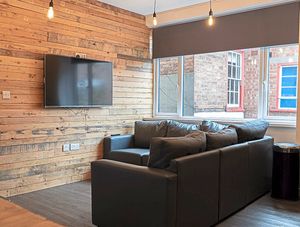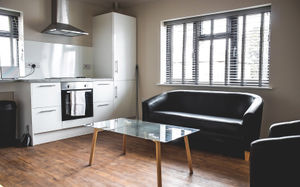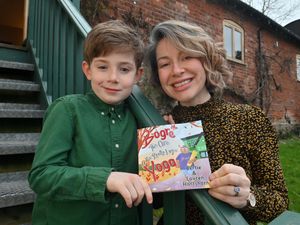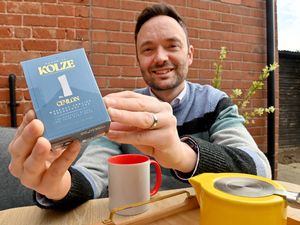A lifeline for the homeless and vulnerable
For three years Lotus Sanctuary has been offering a lifeline to vulnerable women and the opportunity for a more positive future

Not only does the social enterprise provide safe and comfortable housing but it also ensures they receive the practical and emotional support they need to rebuild their lives.
Lotus Sanctuary helps women who are facing homelessness, from rough sleepers to domestic violence victims, sexually exploited women and those in recovery from drug and alcohol addictions.
Wolverhampton-born community interest company Lotus, which is driven by a desire to offer more than bricks and mortar, has seen referrals for its wrap-around support surge during lockdown.
Lotus currently providing up to 550-bed spaces in a mixture of different properties ranging from single apartments and smaller, two-bedroom properties to larger houses of multiple occupancy.

The accommodation always includes the essentials; basic furniture such as a bed, chest of drawers, tables and chairs are provided as well as white goods and appliances including fridge, cooker, toaster and kettle.
Typically, properties are provided for two years and, during that time, the organisation works closely with the resident to understand their issues before creating a bespoke pathway to independence.
This might include mental health and specialist support, access to training and a host of volunteering or employment opportunities.
“There are over 300,000 people currently homeless or living in temporary accommodation, from the rough sleepers who have become a familiar sight in our cities to the hidden homeless, sofa surfers or those living in shelter,” says chief executive Gurpaal Singh Judge.
“Combating houselessness is an issue in itself, with a shortage of housing in the UK. However, homelessness is something we are only starting to realise is a deeper issue that sits within the hearts and minds of our residents. More than an issue of bricks and mortar, it’s an issue of trust and trauma. A house isn’t always a home.

“A woman who has sought drugs as a way to escape the past or ongoing violence, only to find herself in a male-dominated hostel or sleeping on the streets needs more than a house or a flat to solve her problems.
“As a sector we need to realise that it’s homelessness we need to solve by working with our residents to create that same sense of belonging that we all feel at home.
“That can only be done by a multi-pronged approach – a holistic, person-centred programme, tailored to fit the needs and requirements of the individual,” he explains.
Among those who have been helped by Lotus is a 30-year-old woman living in the Black Country, who wished to remain anonymous. She was referred to to the organisation in October after a spell in hospital receiving mental health treatment.
Staff provided her with accommodation as well as extra support to enable her to live independently and develop skills such as budgeting, which she says was “very helpful”.
“It was a big transition because I had never lived on my own before,” she said.
Thrived
Since then she has thrived and will be enrolling on a Access to Higher Education Diploma (Health Professionals) course, which will be the first step towards a career as a occupational therapist.
The future student, who is also working towards moving out of the supported accommodation and into a more long-term home when she is ready, says she is very grateful for the support she has received from Lotus.
“I think it’s fantastic. There’s not many services out there that are doing what Lotus Sanctuary are doing to assist vulnerable women. I’ve come a long way,” she said.
Lotus now has plans in place to quadruple the number of people it can help on the path to independence over the next 12 months.
With the help of over £30million of private sector investment, it has been able to lease a mixture of one, two and three-bed properties across the region as well as in the East Midlands, the North West, the North East, the South West and Yorkshire and Humber.
It is aiming to be able to offer more than 2,000 beds by 2022, with the biggest growth being in the Midlands and Greater London.
Whilst the focus will still strongly be on supporting vulnerable women, the decision has been taken to create units for mothers with children and separate dedicated properties for men.
“Volunteering is another fully fledged provision we are adding, giving volunteers the chance to get involved in supporting our residents,” says business development manager Stephanie Knight.
“This carries a two-fold benefit of bolstering the amount of support we offer individuals and creating a pathway into employment for the volunteer – a win-win we like to think.
“Our mission is to eradicate homelessness and to do that we need to be bold and brave. This means we are exploring financing options to start the purchase of freehold properties for Lotus Sanctuary itself, instead of us leasing, and are hoping to open coffee shops and second-hand furniture stores that can be staffed by our residents.
“Covid-19 and lockdowns are naturally presenting challenges for our plans, but we are determined as ever to take the Lotus ‘approach’ to as many people as we can,” she adds.
For further information, visit lotussanctuary.co.uk or follow @lotus_sanctuary on Twitter





